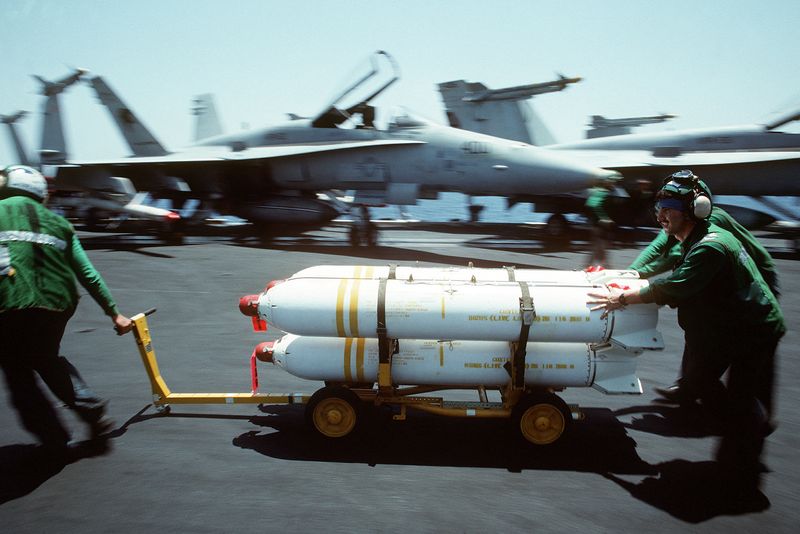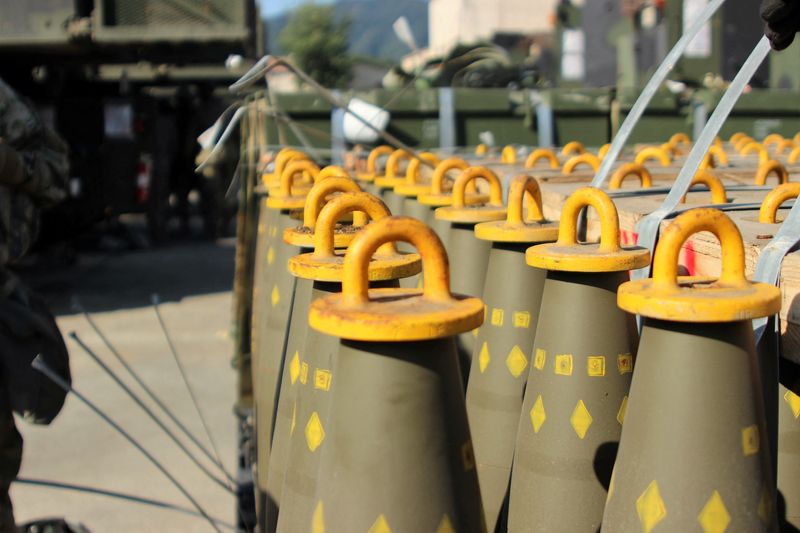(This March 6 story has been corrected to delete size of U.S. stockpile and reference to Textron (NYSE:TXT) previously making MK-20 cluster bomb in paragraph 15)
By Jonathan Landay
WASHINGTON (Reuters) - Ukraine has broadened a request for controversial cluster bombs from the United States to include a weapon that it wants to cannibalize to drop the anti-armor bomblets it contains on Russian forces from drones, according to two U.S. lawmakers.
Kyiv has urged members of Congress to press the White House to approve sending the weapons but it is by no means certain that the Biden administration will sign off on that. Cluster munitions, banned by more than 120 countries, normally release large numbers of smaller bomblets that can kill indiscriminately over a wide area, threatening civilians.
Ukraine is seeking the MK-20, an air-delivered cluster bomb, to release its individual explosives from drones, said U.S. Representatives Jason Crow and Adam Smith, who both serve on the House of Representatives Armed Services Committee. That is in addition to 155 mm artillery cluster shells that Ukraine already has requested, they said.
They said Ukrainian officials urged U.S. lawmakers at last month's Munich Security Conference to press for White House approval.
Ukraine hopes cluster munitions will give it an edge in the grinding fight against Russian forces in eastern Ukraine.
The Ukrainian government has said publicly that it wants U.S. cluster munitions. The petition for MK-20s - also known as CBU-100s - has not been reported previously.
The Ukrainian Embassy referred Reuters to the defense ministry in Kyiv, which did not immediately respond to a request for comment.
A National Security Council spokesperson said that while Ukraine and the White House "closely coordinate" on military aid, she had no "new capabilities to announce."
FIGHTING THE "HUMAN WAVE"
Ukraine wants the artillery rounds - the Dual-Purpose Conventional Improved Munitions (DPICM) - to halt the kinds of "human wave" attacks that Russia has mounted in its months-long drive to overrun the ruined eastern city of Bakhmut, the lawmakers said.
Each shell disperses 88 submunitions.
The MK-20 is delivered by aircraft. It opens in mid-flight, releasing more than 240 dart-like submunitions, or bomblets.
The Ukrainian military believes these submunitions "have better armor-piercing capability" than the weapons it has been dropping from drones, said Smith, the top Democrat on the Armed Services Committee.
Ukraine, battling an enemy with more manpower and weaponry, has used drones extensively for surveillance and for dropping explosives on Russian forces.
Crow, a Democrat and U.S. Army veteran, said he might support giving the MK-20 with assurances that Ukrainians would remove the bomblets and "use them in a non-cluster employment."
Production of the MK-20s ended years ago, but the U.S. military retains a stockpile of the Cold War-era weapon.
Republican Senator Lindsey Graham, who also participated in last month's conference, confirmed that Ukrainian officials in Munich urged U.S. lawmakers to press the White House to provide Kyiv with cluster munitions. He said he would do so this week.
The congressional aide, speaking on condition of anonymity, said Ukrainian officials also privately have been lobbying lawmakers in Washington to press for White House approval.
"That's not going to happen," Smith said, referring to Biden administration signoff.
CONTROVERSIAL WEAPONS
Since the start of the conflict Ukraine has asked for - and largely received - weapons that the U.S. initially refused, including HIMARS missile launchers, Patriot air defense batteries and Abrams tanks. But cluster munitions could be a step too far for the administration and some in Congress.
Opponents argue that when bomblets scatter they can maim and kill civilians and have high failure rates, with duds posing a danger for years after a conflict ends.
A 2008 pact prohibiting the production, use and stockpiling of cluster munitions has been adopted by 123 countries, including most of NATO's 28 members. The United States, Russia and Ukraine have declined to join.
Giving the Ukrainians "a banned weapon would undermine their moral authority in a way that (Russian President Vladimir) Putin would exploit," said Tom Malinowski, a former congressman who served as the top State Department human rights official.
But there is some support in Congress. The congressional aide said most Republicans "are fairly amenable" to Ukraine's requests.
"This is a war where (the Ukrainians) are outmanned," Graham told Reuters. "And cluster munitions really are pretty lethal to mass formations as well as armor. In the areas where they are going to use this stuff there are no civilians."
A 2009 law bans exports of U.S. cluster munitions with bomblet failure rates higher than 1 percent, which covers virtually all of the U.S. military stockpile. U.S. President Joe Biden can waive the prohibition.
Ukrainian and Russian forces both have used such weapons since Russia first seized Ukrainian territory in 2014, according to news reports and human rights groups.
The U.S. Army is spending more than $6 million a year to decommission 155 mm cluster artillery shells and other older munitions, according to budget documents
Providing DCIPMs would ease shortages of other kinds of 155 mm shells that Washington has been shipping to Kyiv in massive quantities, the congressional aide said.

Crow said he opposed providing the DCIPMs to Ukraine because of the high failure rate of the bomblets, which would worsen Ukraine’s already massive unexploded ordnance problem.
The State Department says that some 174,000 square-kilometers of territory – nearly one-third of Ukraine – are contaminated by landmines or other "explosive remnants of war."
